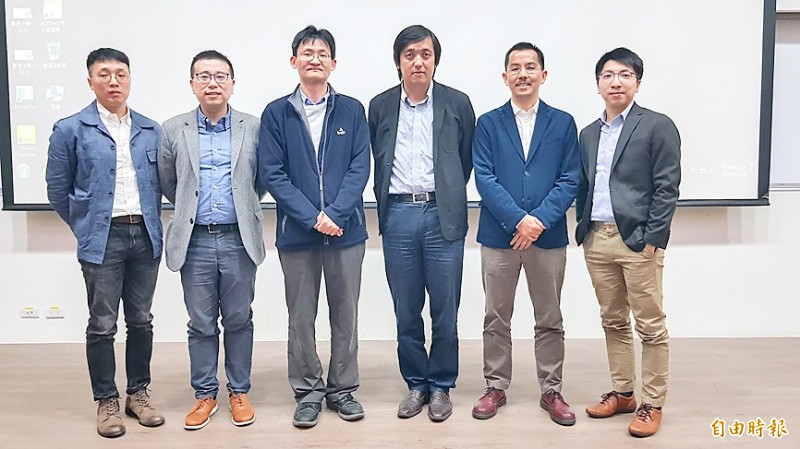《TAIPEI TIMES》 HK academic tells of system’s dark side

From left, Hang Seng University of Hong Kong Department of Social Science assistant professor Gary Tang, City University of Hong Kong Department of Public Policy associate professor Cheng Wai, an unidentified man, Chinese University of Hong Kong School of Journalism and Communication professor Francis Lee, City University of Hong Kong Department of Public Policy professor Yep Kin-man and Lingnan University Department of Political Science assistant professor Yuen Wai-hei pose for a picture at National Tsing Hua University in Hsinchu City yesterday. They are to discuss the Hong Kong pro-democracy movement at Academia Sinica in Taipei today. Photo: Chien Hui-ju, Taipei Times
‘ONE COUNTRY, TWO SYSTEMS’: Professor Yep Kin-man said Beijing has subverted the territory’s legal system and would do anything to tighten its grip on Hong Kong
By Chien Hui-ju / Staff reporter
A visiting Hong Kong academic yesterday highlighted four negative effects China’s “one country, two systems” formula has had on Hong Kong.
City University of Hong Kong professor Yep Kin-man (葉健民) told a panel in Taipei at National Tsing Hua University that the pro-democracy movement in Hong Kong sparked by a since-withdrawn extradition bill has led many people to raise doubts about the territory’s reunification with China.
Most Hong Kongers had been optimistic about the territory’s handover from the UK to China in 1997, believing they could still enjoy democracy, but they have become disillusioned after seeing the “true colors” of the Chinese Communist Party, Yep said.
The first negative effect of the “one country, two systems” formula has to do with “one country,” which the Hong Kong authorities have staunchly defended, due to a belief that the protest movement was orchestrated by “Hong Kongers” who detested “mainlanders,” he said.
The Hong Kong government has reached the point where it would take action against anyone who dared even to say: “Let’s go, Hong Kong people,” he said.
“If you were a celebrity, your career would be ruined in China,” Yep added.
Second, Beijing would do anything to tighten its grip on the territory, even at the cost of Hong Kong’s capitalist system, he said, citing the example of Cathay Pacific, whose chief executive officer had to step down to “take responsibility” for employees’ vocal support of the pro-democracy movement.
It has become evident that, like Chinese companies, Hong Kong businesses have to be politically correct to survive, he said.
Third, people have realized that the territory is not allowed to exercise self-governance, which runs counter to their long-standing belief that Hong Kong still enjoyed a high level of autonomy, he said.
Hong Kong Chief Executive Carrie Lam (林鄭月娥) and her bureaucrats have remained in their posts six months into the unrest, as they are not allowed to leave without Beijing’s approval, he said.
Fourth, the territory’s legal system has been subverted, as evidenced by Beijing overruling the verdict of a Hong Kong court that said a mask ban was unconstitutional, he said.
Even though the Chinese National People’s Congress has the right to pass down a final interpretation of the Basic Baw, Hong Kong courts should be allowed to operate independently, he said.
The rule of law is one of the protesters’ central demands, next to democracy and accountability for excessive use of force by police, he said.
In 1997, Hong Kongers believed that the territory was precious to Beijing because of its contributions to the economy, and assumed that it would be safe from any potentially disruptive interference, he said.
However, six months of unrest has proved that Hong Kong no longer has the advantage, and that Beijing will always act according to its political considerations, he said.
This is a warning to Hong Kong, whose residents must devise other ways to push back against the system, he said.
There has not been any substantial opposition to the theories he has presented, which could mean that Beijing is weak at academic discourse — a weakness that could be exploited by academics against the Chinese government, he said.
Yep and City University of Hong Kong associate professor Cheng Wai (鄭煒), Chinese University of Hong Kong professor Francis Lee, Lingan University assistant professor Yuen Wai-hei (袁瑋熙) and Hang Seng University of Hong Kong assistant professor Gary Tang (鄧鍵一) are to discuss the Hong Kong pro-democracy movement at Academia Sinica in Taipei today.
新聞來源:TAIPEI TIMES



















